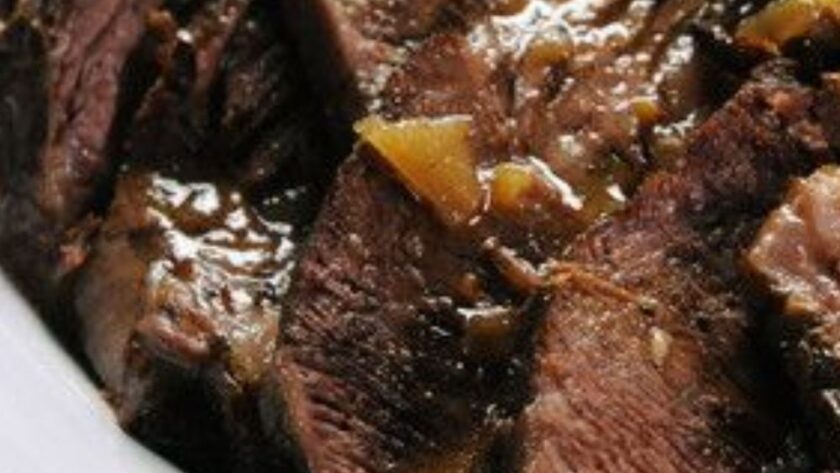The oven was already on. I wasn’t thinking shortcake. I wasn’t thinking much of anything. Just standing barefoot in the kitchen with one sock on and a head full of fog. One of those days that smells like rain even if it hasn’t. One of those moods where everything tastes like a sigh.
There were strawberries. Too many. Mae had brought them home like a gift I didn’t ask for, overripe and a little dented, tumbling out of the colander like they had something to say. I remembered Her Highness’s version—not because I was craving it. Because I needed something to do with my hands.
What the Original Looked Like
Martha’s strawberry shortcake doesn’t flinch. It’s stacked like a magazine cover. Biscuits tall enough to argue with. Whipped cream that holds its shape like it’s proud. She macerates the berries properly, with just enough sugar to make them weep.
Her dough—of course—is pulsed, precise, polite. Cold butter. Cold cream. Cold eggs. No mess. Just science disguised as dessert.
And it’s good. It is. When I made it her way last summer, I followed every rule. Mae called it a “TV dessert.” She meant that as a compliment.
What I Did Differently
I didn’t have enough cream. Used half-and-half and a splash of leftover sour cream. There’s something about sour cream in sweet things—it wakes them up. The biscuits came out softer, not as tall. More slouch than strut.
I added salt to the strawberries. Not a lot. Just enough to make them taste like they remembered the dirt.
Didn’t whip the cream fully. Just let it get thick enough to stay in a spoon. I was tired. And the beater was still wet from something else.
The Way It Happened in My Kitchen
I measured nothing right.
I packed the dough too tight.
I dropped one on the floor and gave it to Alfie because why not—he was staring like he understood how I felt.
The berries sat in the green Pyrex from college. Still has the chip on one side. Still spins funny in the microwave. I stirred them with my fingers. They stained. I didn’t care.
Mae came in halfway through, asked if I was “doing something emotional.” I said no. She didn’t believe me. She picked at a biscuit, said it looked like a scone that forgot its name.
The smell of the warm strawberries—sugar, acid, memory—made me think of that lemon cake collapse. Her tiny hands pressing batter into a springform pan too big. The way she cried when it caved. The way I didn’t. Just ate it off the rack like grief had frosting.
Anyway. I split the biscuits with a knife that needed sharpening. Layered soft things on crumbly things. The juice soaked through. It didn’t hold its shape. It slouched. It sighed.
And it was exactly right.
A Few Things I Learned
Warm strawberries taste louder.
You don’t have to sweeten cream if the berries tell a good enough story.
Biscuits that fall apart are easier to eat with your fingers.
That dent in the Dutch oven still makes me flinch. Even when I’m not using it.
What I Did With the Extras
Ate one over the sink. Cold. No cream. Just jammy berries on a half-biscuit. Mae said I looked like I was thinking about something sad. I was.
Would I Make It Again?
Maybe. But not in June.
That’s As Much As I Remember
It got quiet after. The good kind. The kind where the kitchen smells like sugar and nothing’s burning.
If you’re after something warmer, I did a leek thing last December that hit harder. But this one? It was soft in a different way.

FAQs
Skip it. or add a splash of vinegar and pretend. it’s the acidity that matters, not the bottle. i’ve used leftover pickle juice once. not proud. not ashamed either.
Yeah, but the potatoes get weird. soft in a tired way. still edible. just… know what you’re walking into.
sure, but don’t go too lean. this isn’t a place for health food. chuck roast has the fat, and the fat tells the story.
Oh, absolutely. it gets better the next day. like soup. like apologies. just reheat it gently—don’t boil it into oblivion.
Check out More Recipes:

Martha Stewart Pot Roast Recipe
Description
Made it with less cream and more feeling. The biscuits slouched, but so did I.
Ingredients
Instructions
- Brown the roast: pulled the meat from its paper like it was a letter i didn’t want to open. salted it more than she said to. heated the butter until it almost burned, then dropped the roast in. loud sizzle. smelled like confrontation. turned it with tongs i don’t trust. both sides, until it looked like it could stand up for itself.
- Build the broth: poured in the wine first. maybe too much. it steamed and spat like a memory. added the broth, garlic, onions—cut big, like hope. bay leaves, thyme, tomato paste scraped from the jar with a butter knife. stirred it like i meant it. watched it come to a slow, uneven simmer. lid on. oven.
- Roast it slow: three hours. did laundry. forgot laundry. mae asked if i was okay. said yes. not sure i was.
- Add the vegetables: pulled the pot out. it was heavy and forgiving. dropped in the carrots and potatoes—unpeeled, unapologetic. back in the oven. another hour. smelled like something warm was trying to reach me.
- serve it quiet: pulled the roast onto a plate i chipped last month. spooned the vegetables like they mattered. skimmed the fat but left a little. sliced thick. didn’t say grace, but i paused. mae took the end piece. i let her.
